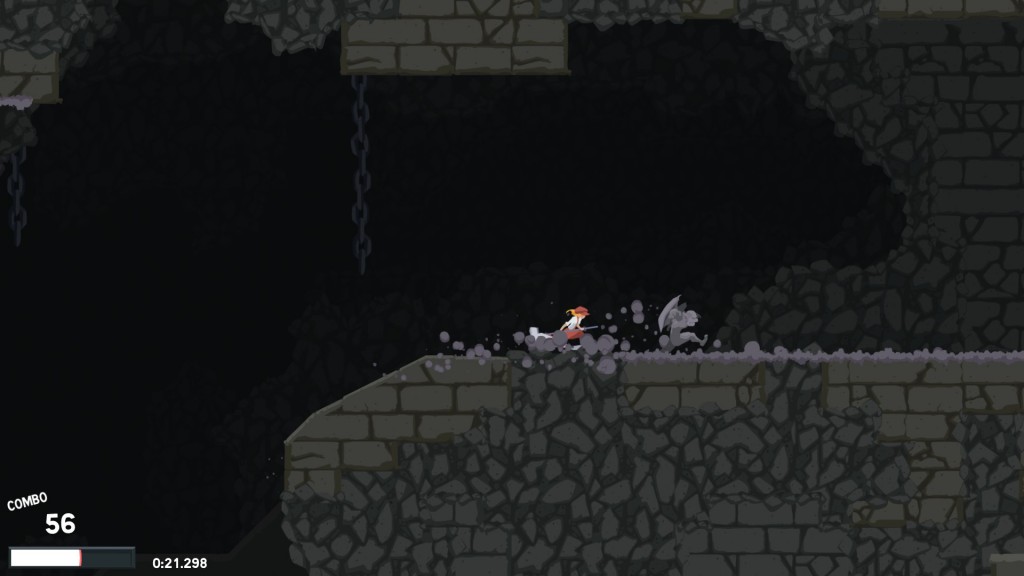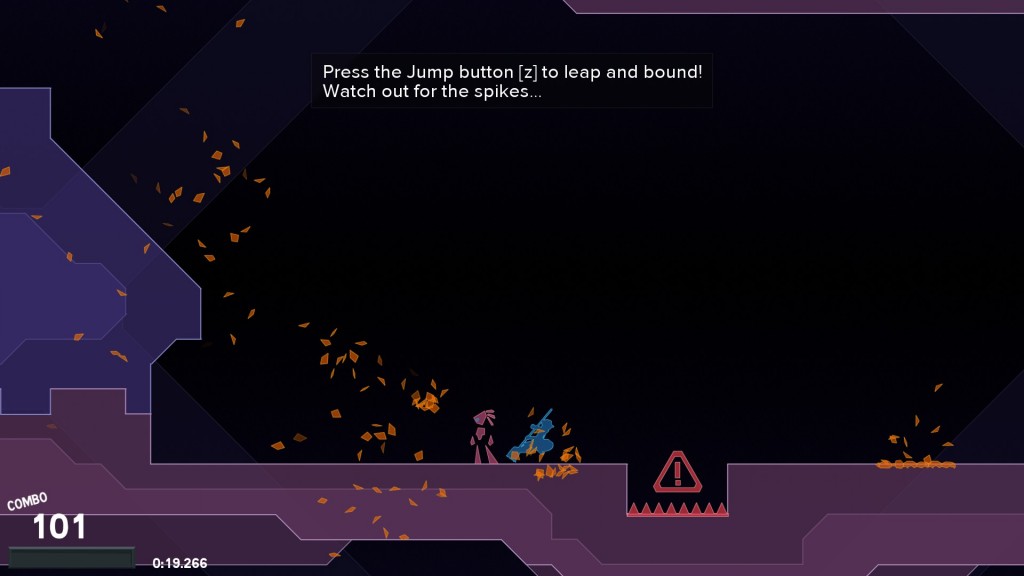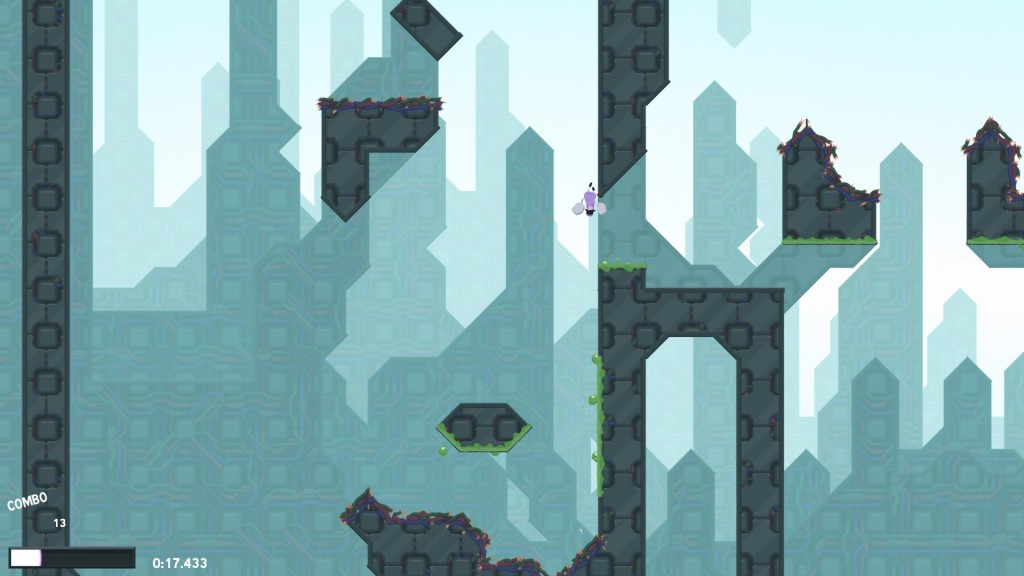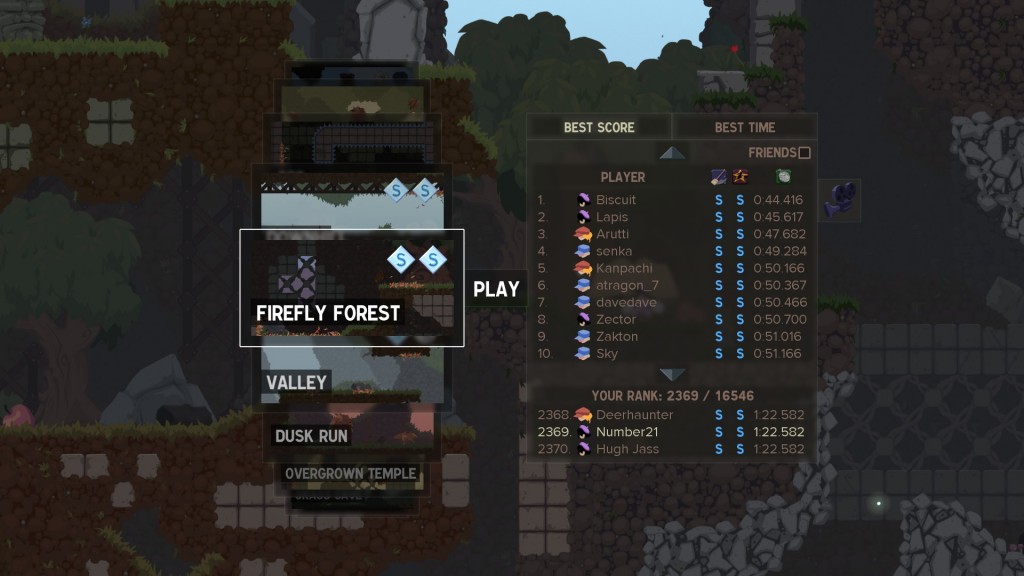Publisher: Hitbox Team
Developer: Hitbox Team
Medium: Digital Download
Players: 1-4
Online: Leaderboards
ESRB: RP – Rating Pending
Dustforce is a game about what it’s actually like to be a janitor– the secret ninja tests, learning to double jump, and air dashing are all a prerequisite to cleaning up surface messes. Fortunately for us, Hitbox saves everyone the trouble of doing anything physical while still being able to enjoy speed cleaning by virtue of releasing an indie title to PC.
As it stands, sweeping can actually be fun, but there’s still no verdict on vacuuming.
 While Dustforce isn’t reinventing any platforming basics, it does change your perspective on surfaces. Ceilings, inclines, and walls are all surfaces which need to be cleaned by any measure. The game begins with a tutorial that quickly and competently breaks down how to maneuver the 2D world in under three minutes; an introductory level which is followed by a difficulty curve that looks like it’s quickly angled towards the moon. For anyone who’s been meaning to scratch a classic platformer itch since Super Meat Boy, there’s a love letter to you in Dustforce.
While Dustforce isn’t reinventing any platforming basics, it does change your perspective on surfaces. Ceilings, inclines, and walls are all surfaces which need to be cleaned by any measure. The game begins with a tutorial that quickly and competently breaks down how to maneuver the 2D world in under three minutes; an introductory level which is followed by a difficulty curve that looks like it’s quickly angled towards the moon. For anyone who’s been meaning to scratch a classic platformer itch since Super Meat Boy, there’s a love letter to you in Dustforce.
What Hitbox has created is a gorgeous-looking test of skill of the likes not seen since SMB or some other game I can’t think of off the top of my head. Platformers exist on the basis that their core mechanics are simple and versatile, which gives players a simple toolset to romp around a given level with. It’s what makes Mario such a success – as well as Meat Boy’s tightly wound controls – in that nothing is impossible if you know how to drive the game. Controlling jumps in Dustforce is just as critical as it is in what we’ve come to understand in past titles, but more interesting is the attention drawn to covering surfaces in a specific route rather than B-lining to the finish. That’s not to say that time isn’t of the essence, as the online leaderboards will assuredly humble players into repeated viewings of the top score’s run until there’s simply no physical way to move a thousandth of a second forward, but S-ranking a level depends on both skill and coverage.
Basically, one must learn to walk before they can lose their legs in an automobile accident and later break records with prosthetic appendages– or something.
 In every good test of patience are also tiers of breaking points, where the tolerance to rage quit is built on markers. Dustforce has at least four of these, respectively: 1) before S-raking the completion or skill in a level (god forbid both on the first try), the path to success needs to be weaseled out. Most early levels are fairly obvious in what direction to head in order to fully clean up the area. After doing this, you’ll want to 2) maintain your combo, which involves constantly cleaning or attacking enemies without taking any damage or letting too much time pass between dusting. If you can’t keep a combo it breaks, and away goes your S-rank for the playthrough. Dear enemies that cheap shot me on approach at the homestretch: [language not appropriate for review of an E-rated title].
In every good test of patience are also tiers of breaking points, where the tolerance to rage quit is built on markers. Dustforce has at least four of these, respectively: 1) before S-raking the completion or skill in a level (god forbid both on the first try), the path to success needs to be weaseled out. Most early levels are fairly obvious in what direction to head in order to fully clean up the area. After doing this, you’ll want to 2) maintain your combo, which involves constantly cleaning or attacking enemies without taking any damage or letting too much time pass between dusting. If you can’t keep a combo it breaks, and away goes your S-rank for the playthrough. Dear enemies that cheap shot me on approach at the homestretch: [language not appropriate for review of an E-rated title].
3) You suck at jumping. And running. And 2D parkour. While you may be a master of the tutorial level, and even a few of the opening forest sections, it’s going to take some time to understand the game’s nuances about when exactly double or triple jumping is allowed, if a wall jump is necessary or whether air-dashing will toss you far enough to safety, and so on. Seeing as characters can literally be guided along 90-degree angles until upside down with just the joystick/arrow keys, and will even give a brief hop off walls at the end of a vertical run, there appears to be a wealth of finesse to wrangle in the most basic of actions. Learning to understand which character you play best with is its own bit of research as well, but anticipating how your inputs will be affected by environment design or animation flourish is an entirely different beast which must be tamed before real progress begins. The most frustrating part comes straight from 4) the game’s own difficulty. Later stages will have you questioning your sanity, and while S-ranking easy levels to unlock harder rooms is a challenge at first, what lies beyond the gold locks are some of the most quizzically designed levels I’ve seen in maybe my entire life.
 In spite of the game’s intimidating final areas, the buttery smooth controls are enough to warrant “a few more levels” or romping around in the generously intricate overworld. It’s a rarity anymore to discover a game which is inherently as fun to play as something like Dustforce, but lucky for both the player and the game that there’s a way to blow off steam in the same world that can create a great deal of pent up frustration in a minute or less. Not to mention that it’s always giving you a reason to revisit previous levels, be it moving up on the global leaderboard, simply trying to outdo a friend, getting that double S-rank, or regaining confidence in your ability to tackle the seemingly impossible area you’re all caught up on.
In spite of the game’s intimidating final areas, the buttery smooth controls are enough to warrant “a few more levels” or romping around in the generously intricate overworld. It’s a rarity anymore to discover a game which is inherently as fun to play as something like Dustforce, but lucky for both the player and the game that there’s a way to blow off steam in the same world that can create a great deal of pent up frustration in a minute or less. Not to mention that it’s always giving you a reason to revisit previous levels, be it moving up on the global leaderboard, simply trying to outdo a friend, getting that double S-rank, or regaining confidence in your ability to tackle the seemingly impossible area you’re all caught up on.
 Shortcuts such as a Level Tome in each overworld area make navigating the sum of the game a breeze, but the inability to fast travel to areas or reference an overworld map seems like an obvious oversight when considering the convenience of being able to select any previously played level from an area theme’s hub. While I understand that exploration is part of the fun in Dustforce, needing to physically discover and unlock new levels would be greatly aided by some sort of map in order to understand what areas have been accessed or levels which are yet to be unlocked. On the same note of accessibility, controller support is supported but with no button to access the menu screen in-game, and while the keyboard provides a fast reset key at R by default, it only brings up the menu to a preselected ‘Restart’ option, rather than instantly reconstituting the level. Small disconnects such as this impede what could be a perfect platforming experience.
Shortcuts such as a Level Tome in each overworld area make navigating the sum of the game a breeze, but the inability to fast travel to areas or reference an overworld map seems like an obvious oversight when considering the convenience of being able to select any previously played level from an area theme’s hub. While I understand that exploration is part of the fun in Dustforce, needing to physically discover and unlock new levels would be greatly aided by some sort of map in order to understand what areas have been accessed or levels which are yet to be unlocked. On the same note of accessibility, controller support is supported but with no button to access the menu screen in-game, and while the keyboard provides a fast reset key at R by default, it only brings up the menu to a preselected ‘Restart’ option, rather than instantly reconstituting the level. Small disconnects such as this impede what could be a perfect platforming experience.
Dustforce is a steal at any price under $20 with its wealth of content, including local multilayer (which begs for the future incorporation of online multiplayer to be patched in) and a level editor-to-be proposing a healthy life past release for the title. While it has caveats and nuances that initially seemed confusing (such as controller input being digital rather than taking advantage of analog input and pressure-sensitive buttons), these gameplay design decisions reveal themselves in time, at least in adjusting to them. Chalk up more precise controller integration to my small wishlist of little things I’d like to see patched. The fact that it costs half of my proposed cost-against-value, it’s impossible for me not to recommend any fan of platformers or 2D games to wait any longer to play it. What a great way to build an argument, right? Nonetheless, not only is there a tightly wound indie game to champion as a diamond in the rough for 2012, it’s wrapped within a great coat of aesthetics and a dreamy little soundtrack to go with it. Very worth one’s time, outside of becoming an actual ninja janitor.

